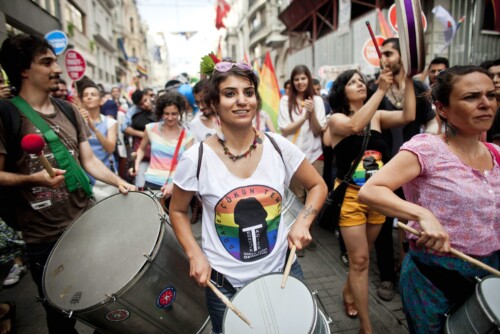“If the left is fundamentally about constructing a society without exploitation and oppression, I don’t see why or how gay issues would not be part of its program for American society.”
—John D’Emilio 1
I evoke John D’Emilio at the outset of this piece with the caveat of extending his statement from “gay issues” to “sexuality” in order to discuss the strategic, political and, to a degree, theoretical effects of the somewhat fraught intersections and impasses between the contemporary politics of sexuality and the politics of “the left” in the U.S. Building on queer leftist scholarship, I argue that the left in the U.S. has opted for a representationally inclusive approach to sexuality, in that more LGBT individuals are part of American left organizations than ever before. However, because the left has maintained its analytic focus on class per se, it has left the “thinking” on sexuality and other social categories of analysis to other movements. This has meant that the left, when it does speak out on issues pertaining to sexuality, has moved away from its earlier position of openly espousing normative rules for sex and sexuality, but it has tended to show its support for progressive sexuality-based campaigns through endorsements of juridical positions held by fairly centrist sexuality rights activists. This means that when it comes to sexuality, the left has often supported positions that are ultimately at odds with left critiques of liberal states.
To mobilize this argument, I discuss the interventions of Wendy Brown and Janet Halley, as well as queer left perspectives on the mainstream left, and how all of these may be understood in relation to contemporary debates on gay marriage and sex work. Although this piece is informed by my own engagements with both Old and New Left formations in the U.S. and in India, the examples and insights I offer here are mainly derived from my engagement with movements in the United States. This essay should be read within the tradition of internal critique, in the sense that my own commitments are allied with queer and sex worker struggles, with those of the left, and especially within the intersecting, though constrained, spaces that they share.
Terms of Critique
The terms “sexuality” and “the left” both beg clarification. I use the terms “left” and “the left” in three contexts, enumerated here in order of their primacy to my critique. First, I use these terms to indicate the ethnographic category of “the left,” as constructed and inhabited by (and against) “progressive” and left activists in the U.S., and as it is used in the somewhat fraught daily life of American political discourse. Second, I use these terms to signal intellectual production and a set of social movements that use, and generate, political frameworks mediated through discourses of political economy. Third, I use these terms to indicate the tradition of scholarship and critique that has both rested within and extended Marxism. Given the rich and disparate nature of the Marxist tradition, the unity indicated by the term “the left,” always prepended by the definitive article and articulated in the singular, is especially ironic, considering that it describes an agglomeration in motion; as such, imbuing it with anything but the broadest descriptive characteristics, especially in this kind of schematic analysis, would be impossible. The efflorescence of leftist politics contributes to the complexity and irony of the unitary fiction that the term describes. At the same time, “politics” itself remains a fraught enterprise, in which hierarchies based on access to resources, members, and analysis remain. In a previous issue of The Scholar and Feminist Online, Lisa Lowe reminds us that politics cannot be sequestered within the state, an insight that helps to frame the problematics that emerge between sexuality and the left as well.
“[A] focus [that] defines ‘politics’ in terms of states . . . excludes, on the one hand, the ‘politics’ of popular social movements or workers’ struggles beneath the level of the state or organizing transnationally, and on the other, communist or socialist nonwestern states like China or Cuba, or those newly independent nations in Africa, Asia or the Caribbean whose narratives of political development diverge from the ‘modernization’ model based on states in Europe or North America. A shared definition of ‘politics’ as the activities of states and international regimes obscures an understanding of how government, interest, and power affect the lion’s share of the non-elite world.” 2
Lowe’s articulation of “politics” as exceeding the parameters of states, and of state apparatuses of governance in particular, may be productively read in relation to E.P. Thompson’s much earlier assertion that “the left” is, by definition, changeable and constantly changing.
“We rejected—as I still reject—any description of Communism or of Communist-governed societies which defines these in terms of their ruling ideologies and the institutions of their ruling elites, and which excludes by the very terms of its definition any appraisal of the conflicts characteristic to them, of the alternative meanings, values, traditions and potentials which they may contain.” 3
This changeability results in left movements that are quite diverse in the ways they make decisions and locate organizational power, while all turning on the question of class, and the fact of uneven economic distribution, at the heart of leftist analysis and politics. Regarding the question of uneven distribution, in the mid-1990s, Wendy Brown observed that:
“Indeed, much of the progressive political agenda in recent years has been concerned not with democratizing power but with distributing goods, and especially with pressuring the state to buttress the rights and increase the entitlements of the socially vulnerable or disadvantaged: people of color, homosexuals, women, endangered animal species, threatened wetlands, ancient forests, the sick, and the homeless.” 4
Brown’s point remains relevant for the contemporary moment, when the rights of marriage, for example, are being promoted for distribution to same-sex couples, maintaining the status of both marriage and of unmarried people. With respect to terms, this use of progressive is, in my view, uniquely American. Few other places in the world use the term progressive to mean something roughly leftist, roughly liberal, and roughly radical, all at the same time. Yet the idiosyncratic history of the left in the U.S., which I discuss briefly in the sections that follow, has itself given rise to this usage of progressive. Brown makes it clear that some progressive political agendas in the U.S. have slipped, or jumped, into liberal frameworks partly because of this take on questions of distribution and rights. At the same time, liberalism is not “a political position opposite to conservatism but a political order that replaces Tudor monarchy rooted in explicit class privilege with modern democratic constitutionalism rooted in abstract individualism.” 5 Liberalism has a potentially problematic relationship to the question of distribution because of “the effects of the depoliticized status of political economy in liberal orders.” 6 The Marxian emphasis on the distribution of power and resources should be understood as distinct from liberalism’s emphasis on social equality and the equal distribution of individuals’ rights. It is the emphasis on the individual in liberalism that I highlight here as being distinct from the Marxian emphasis on classes, along with the “effects of the depoliticized status of political economy,” two distinctions that are especially relevant to the discussion on sexuality because of the ways in which sexuality-based movements have been located and criticized within the terrains of “identity politics,” which I also discuss in this essay. This is not to say that classes and individuals are mutually exclusive entities, but that the respective emphasis on each helps to define and maintain a distinction between Marxism and liberalism. The qualifications of this distinction continue to offer much fuel for debate, though they are beyond the scope of this essay. The tensions between Marxism and the left and liberalism are salient here because sexuality-based movements, scholarship, and politics in the U.S. live within the slippery rubric of progressivism that marks these tensions.
- John D’Emilio. “Can the Left Ignore Gay Liberation?” New Politics 12.1 (Summer 2008): 45. newpolitics.mayfirst.org/fromthearchives?nid=103.[↑]
- Lisa Lowe. “The Gender of Sovereignty” in “Borders on Belonging: Gender and Immigration.” The Scholar and Feminist Online 6.3 (Summer 2008). 11 November 2008. www.barnard.edu/sfonline/immigration/lowe_01.htm. [↑]
- E.P. Thompson. “An Open Letter to Leszek Kolakowski, 1973.” 3-4. 10 May 2009. thesocialistregister.com/index.php/srv/article/view/5351.[↑]
- Wendy Brown. “Introduction: Freedom and the Plastic Cage.” States of Injury: Power and Freedom in Late Modernity. Princeton, NJ: Princeton University Press, 1995. 13-29: p. 5.[↑]
- Wendy Brown and Janet Halley. Introduction. Left Legalism / Left Critique. Ed. Brown and Halley. Durham and London: Duke University Press, 2002. 1-37: p. 5.[↑]
- Ibid, p. 7.[↑]



